Open For Business is getting rave reviews!
The Sims 2: Open for Business Expansion
By Dave 'Fargo' Kosak
Though complicated, Maxis strikes again with another deep and well-conceived extension to the Sims universe.
Pros:
Tons of business possibilities; lots of fun new items; deep gameplay
Cons:
Adds complexity to core game; slow-going at first; requires other expansions to get the most out of it
Standing at an electronics workbench, a Sim wipes the sweat from his brow. Later on, he'll open his electronics store and sell the robots he's building to his neighbors, but before he calls in his employees he has to create his merchandise. Across town, his sister is running a gym out of her house. She works as an athlete by day and opens her gym when she comes home at night. Sometimes she schmoozes with her customers to get them to stay longer, and sometimes she just goes to bed while they pay her for every hour that they stay. Easy street? Not really -- building your own business in The Sims: Open for Business is a real challenge, but in the end it's worth it for all but the most casual of players.
Open for Business continues a great run for Maxis and EA. While the expansions to the original Sims were hit and miss, so far each of the three packs released for Sims 2 have been well-conceived, with each adding significant content to the core game. While we definitely have some reservations about Open for Business, ultimately it passes the test: It provides a ton of player-driven content and gameplay with the same style and humor that makes the franchise such a riot for casual or serious players.
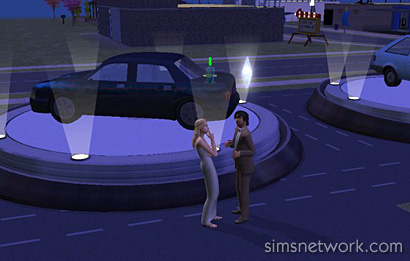
'Miss, I think you would look good in this car.
And your money would look good in my wallet.'
We should note that for GameSpy testing purposes, we played the game with all three expansions installed. If you've just bought the original game and you're looking for what to do next, we'd consider Sims University a must-have. Open for Business works best in tandem with NightLife to give you more business options; we wouldn't recommend grabbing the latest expansion until after you've purchased NightLife. The content from each expansion builds on the earlier games almost exponentially.
What's New?
Where the NightLife expansion allowed Sims to go out on the town and party in clubs and restaurants, Open for Business allows Sims to build and run those same nightclubs and restaurants. Your Sims can also create small home-based businesses or retail megastores, either building their own merchandise via new workbench items or buying things wholesale to sell at retail prices.
Basically, it's possible to take any community lot idea you have and turn it into a business. Want to make a bowling alley? Buy a bunch of lanes and charge admission. Want to build a home and garden center? Arrange a bunch of plants and garden gnomes on your lawn and start selling. Want to run a nightclub? Start blasting music and serving drinks. If you have NightLife installed the types of business you can run grows: Car lots! Poker halls! Fine dining! The real strength of this expansion is how it opens the door to create just about any business. You can also hire and manage employees to do the work for you, and even managers who can manage your properties for you while your Sim is away. See our special SimPrentice series for details of all the new features.
125 new items are available, most related to the types of businesses you can run. New items include an array of small robots capable of doing chores, a series of toys that can be built at a workbench, cash registers to ring up business, and a makeover chair allowing you to perform cosmetic overhauls on your neighbors. New building tools include elevators, shelving, and risers.
How to Succeed in Business by Trying Real Hard
Open for Business actually delves fairly deep into the minutia of running a working business, which is both the expansion's strength and its flaw. Until now, Sims 2 has been pretty easy and self-explanatory. Need to go to the bathroom? Click on a toilet. The University and NightLife expansions made going to college or going out on dates look as easy as a sitcom. But running a business, the way it's implemented in the game, is not so intuitive.
For example, to start a business, you go to your telephone. To hire employees, you use the telephone (or talk to them in person). To open or close your business, you need to buy an "open/closed" sign, which is hidden in the "Decorations" part of the buy mode. To see the status of all your employees, you use a little tab at the top of your screen, but to manage them individually, you have to click on the individual employee. To get employees to come to work, you click on the open/closed sign (not the telephone). To buy merchandise at wholesale prices, you have to click on a special lock-shaped icon at the top of the screen. Confused? It all works, and eventually you'll do it all with ease, but there's a learning curve here that sets this expansion apart from the simplicity of the core game.
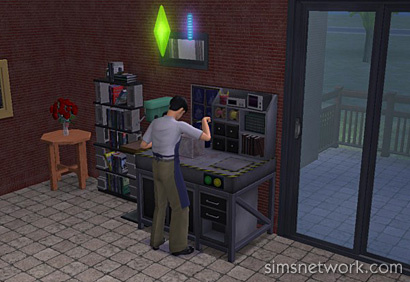
Using workbenches, you can build your own merchandise.
Next up, there's "Talent Badges," a whole new game mechanic jammed onto the original game. Sim Talents include things like flower arranging, sales, restocking, or running a cash register. This system is developed separately, but it's also related to a Sim's skills: Supposedly every talent has an associated skill, although without the manual you'd be hard-pressed to figure out which goes with which. Does the robot-making talent use logic or mechanics? Talents are developed through experience (the only way to learn to use a cash register is to use one day after day), but there's no status bar allowing you to see how it's coming along. It would've been nice if job skills were worked into the game without adding a whole new, separate (and sometimes confusing) system.
These little problems jump out only because the rest of the game is so straightforward. Once you put your mind to it there's nothing here that you can't figure out, and the game's certainly enjoyable once you do. But Open for Business might turn off some of the more casual Sims 2 players, despite the depth of play it offers.
Takin' Care of Business
As for running a business itself, the game has a great balance. It's easy to start a business, but hard to have a successful one. Of course, once a business takes off and gets a life of its own, it can really bring in the big bucks. Building a successful franchise in Open for Business is a lot more difficult than, say, having a dream date in NightLife, but it's way more challenging and rewarding. To paraphrase John F. Kennedy, "We do these things not because they are easy, but because they are hard."
For starters, it takes serious capital to get a business off the ground. The most basic of businesses will require a cash register or ticket machine. And even at wholesale prices, buying a shelf full of merchandise to sell costs a lot of money! It's much easier to run a business if another family member is working a regular job, so at least some income is guaranteed.
Then you have your employees. It's possible to run a business yourself, but difficult to handle the cash register, the merchandise, and the sales all at once without getting a bunch of angry customers on your hands. That's where hired Sims come in: they'll show up for work and take care of things for you. Employees get paid every hour, so you want to have a stash of cash on hand to make sure they don't riot. Of course with the right employees it's possible to live the dream: your Sim sits on a couch eating potato chips while other Sims run around, sell stuff, restock your shelves, and collect your money.
As you'd expect, running a business is a mini-game with its own set of rewards: as you make customers happy, you gain business ranks, and you earn your choice of perks. These include lower wholesale prices, motivational tricks for your employees, or networking skills that give you an instant relationship bonus with every new Sim you meet.
Does it work? Is it fun? Yes! Here's how it all falls down during actual play: you scrape together enough money to open a tiny business with a couple products, and you run the place yourself while people trickle in. You work your Sim raw trying to make ends meet, tweaking the prices just so, and hoping to keep customers happy. It's pretty painstaking. But then, you cross some sort of threshold, and it all starts to pay off. Maybe you get a good review in the paper, or you find just the right Sim to handle sales, or you have enough money to keep the shelves full, and suddenly your business is crawling with customers. There's no shortage of things to do or money to make. It's difficult, but incredibly satisfying.
Open for Business might not appeal to everyone, but it's immensely deep for an expansion pack and worth the work you put into it. It's almost like a whole new game.
Domo Arigato Mr. Roboto...
It's worth noting that Open for Business has the same playful touch that lights up the whole series. For example, an early toy you can make at the toymaking bench is "Sir Bricks-a-lot," which is basically ... a brick ... with a face painted on it. Sims can not only "Play" with Sir Bricks-a-lot, cooing to it like a baby, they can also teach it to do tricks.
The Sims universe is filled with its share of goofy monsters (ghosts and aliens from the original game, zombies from University, and vampires from Night Life). Open for Business continues the tradition by adding robots to the mix. Once you build a robot at the workbench and turn it on, it becomes a part of the family, complete with its own wants and needs. Robots can fall in love or get married. (I didn't get to test if they can have kids...) Robots start with full mechanical, cooking, and cleaning skills, as well as the desire to randomly do chores. It's funny to be sitting around and suddenly your robot starts baking you a pie.
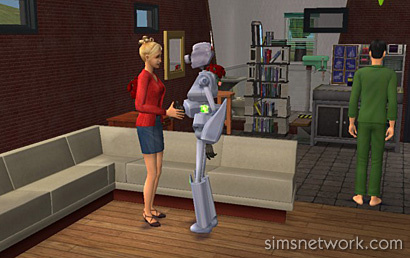
Your plastic pal who's fun to be with.
Robots don't age, and they don't sleep. Instead they use power over time, and can only recharge by standing outside and shutting down while in the sunlight. It's important to keep robots in a good mood since otherwise they'll go berserk and wreck the house -- having one in the family is a game in and of itself. Dress your male robot in "formal" clothes and it'll put on a tuxedo jacket and a rubber human mask that looks hysterical with its big robotic eye sticking through the fake face. Like all great Sim games, Open for Business is wild enough that you'll sometimes just sit there and chuckle at the bizarre situations that crop up. Like when your robot starts freestyling for tips.
The final verdict? It's a little sloppy in the implementation, but overall a solid expansion to a great franchise. By itself Open for Business may not be a must-have, but paired with NightLife, the two packs together will probably add hundreds of hours of gameplay to the series. Running a restaurant, building a trendy nightclub, creating a megastore, opening a cozy little coffee shop -- these kinds of challenges will keep you entertained for months to come.
The Sims 2: Open for Business
Get your entrepreneurial spirit revved up for this latest expansion to the massively popular Sims franchise.
By Adam Pavlacka
When it comes to traditional gaming, The Sims 2 has always been outside of the box. By design, it's a game that isn't: A true sandbox title that gives players the ability to guide virtual characters through life and love without ever bogging them down in real world difficulties. Now the latest expansion, Open for Business, dabbles with complexity for the first time. It's a departure that is both fun and challenging, but also risks alienating casual players in favor of dedicated fans.
Up until Open for Business, "work" in the Simverse simply consisted of sending your sim off to a mystical place for a set number of hours each day. Where they went and what they did was relatively unimportant--it was out of sight, out of mind. With Open for Business, you can not only take your sim to work, but you can start a business from the ground up.
To facilitate the commerce system, Open for Business adds three types of stores to the Simverse: Pay Per Item, Pay Per Use, and Pay Per Time. By using one of these three models you can create virtually any type of retail store. For example, Pay Per Item is the traditional retail model, such as a flower shop. Here, you need to worry about purchasing inventory, stocking shelves, and selling items to the customers. Pay Per Use stores are service oriented, such as a salon, while Pay Per Time stores are places like nightclubs which charge visiting sims by the hour.
Open for Business has a surprisingly open-ended system, allowing you to create a home-based business or open a store in a separate location. Either way, you still have to worry about hiring employees, buying (or making) items to sell, convincing customers to buy, and hoping that those who are happy with their purchase will come back again. Though the depth is to be commended, the early stages of launching a business take quite a bit of micromanaging if you want to be successful.
One of the major new features is the talent system. Talents are work-related skills that help make sims better businesspeople. When hiring employees, it's a good idea to review their talents in order to find a good fit for the job. For example, if you are running a beauty salon, hiring sims with a cosmetology talent will be to your advantage. That said, sims can improve their skills by doing things over and over, so when you find a solid employee, keep them happy.
Management is more than just nurturing good employees though. Sometimes you get a bad apple and if that happens, it's time to give them the pink slip. Just like in real life, firing an employee causes a lot of negative feelings, so be careful when hiring friends to work in your shop.
The new workbench is a novel addition as it allows you to craft items for sale in a store. Some of the items you can create include toys, robots, and flower arrangements. Crafting takes more time, but yields a higher profit margin than buying finished products wholesale. As your store grows, you gain the ability to negotiate lower prices and better deals with your suppliers. What starts out as a local Mom and Pop shop can eventually become the Wal-Mart of the Simverse.
Another new item is the robot that acts like a clone of the Sim that turns it on. The robot can help around the house and work longer and harder than a normal Sim, but eventually it has to recharge by standing outside in the sun. All in all, there are more than 125 new items in the expansion pack.
If Open for Business has any faults, it's that not everything is as intuitive as you would expect. For example, you cannot simply set working hours -- you have to manually open and close your store. You've also got to send employees home after work. If you have a home-based business, your customers don't respect the distinction and will happily wander into your TV room and plop on the couch or explore your bedroom.
There's also the issue of how it works with the other expansion packs. By itself, Open for Business is fun, but it really is designed to work with a game that already has Nightlife installed. Without the second expansion, you can't open a car dealership and your selection of nightclub and restaurant items is severely limited.
Despite these issues, Open for Business is sure to appeal to the long time Sims 2 players out there. The economic model is robust enough to keep things interesting and the complexities of running a business will keep players hopping. If you don't yet own any expansion packs, University or Nightlife would probably make a better choice, but for someone who already has it all, Open for Business is going to add hours of new play time to your favorite game.
The Sims 2 - Open for Business
By Karen Chu
Now I ain't saying she a gold digger...
Cornelius' sister, Pumpernickle Hobbes, ain't a gold digger -- sure, she's jonesing for champagne wishes and caviar dreams, but she's determined to make legit heaps of simoleons on her own. After getting an education (and consequently, four years of clinging to the sorority-house "punch" bowl), and frittering her prime early twenties away at numerous dubious night-spots, Pumpernickle is tired of her raucous lifestyle and dead-end job as a smelly university mascot. Luckily for her, The Sims 2: Open for Business is around the corner, acquainting the Sims world with entrepreneurship, capitalism, and robots.
One part "Insert-Noun-Here" Tycoon, one part good ol' RPG power-leveling, and one part intensive Sim-style micromanaging, Open for Business is proving to be the deepest, most complex, and most complementary Sims 2 expansion so far. It's a big hoorah for hardcore managerial savants, but it's a giant buzz-kill for casual gamers. While a large fraction of players like to jerk up the sandbox dynamics by trapping their Sims inside a moat or making couples "woo-hoo" in hopes of popping out babies like Orville Redenbacher's, Open for Business' well-meditated and algorithmic gameplay requires more brain-cranking and less slack-space for twisted gimmicks. As much as Maxis keeps up the random Sims-style humor with new items like Sir Bricks-a-lot (The Sims' version of a Pet Rock) and ageless servant/lover robots that Sims can build, the process of running a business in-game is no laughing matter. OK, maybe there's some laughing.
One of Open for Business' underlying themes is its glorious ability to customize the hell out of everything, allowing players to be creative but still feel balanced and at ease with the stricter gameplay. The four business approaches (buying and reselling for a profit, creating and selling products, charging admission for a venue, or charging Sims for using an item) can all be mixed and matched in accordance with how much effort you want to put in -- or just what tickles your fancy. While running a yuppie eatery utterly drained my noodle because I overhired my staff and underbuilt my kitchen (among other things), Pumpernickle's quaint toy store/beauty salon got the thumbs up from the hipster crowd. Pumpernickle made her big bucks establishing client loyalty by charging Sims for makeovers (another customizing plus!) on her salon chair, as well as selling toys she perfected over her workbench by power-leveling her toy-making skills. Sims can now train in talent/skill sets and can only build those up through experience&meaning creating something over and over until you're good enough for an upgrade. That's a lot of staring at the screen -- and a lot of Sir Bricks-a-lot, folks.
For future oil tycoons and CEOs, Open for Business can stand alone. For Sims 2 content-junkies, it shacks up nicely with University and Night Life, despite Business' more immense potential to smoke your brain into burnt-carbon oblivion. The game lacks the whimsical feel of playing a "Sim God," but it definitely makes up for it by bringing out your inner Donald Trump in well-conceived entrepreneurial gameplay. It's a tougher -- and leaner -- game than its older expansion-pack siblings, but isn't starting your own business all about being the toughest and leanest?















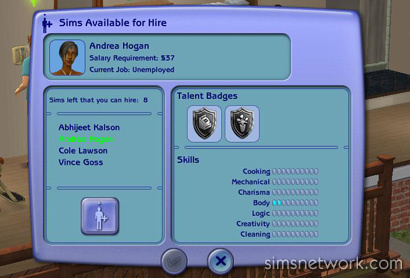

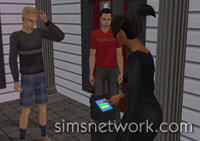 Work From Home!
Work From Home!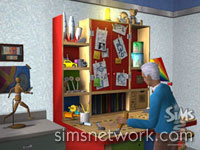 Polish Your Talents
Polish Your Talents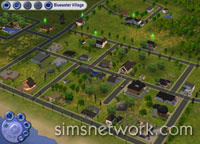 Buy in Bluewater Village
Buy in Bluewater Village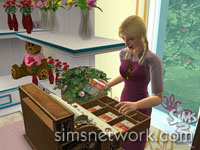 From Rags to Riches
From Rags to Riches There's Real Money in Real Estate
There's Real Money in Real Estate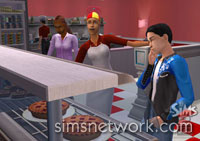 Final Tip
Final Tip